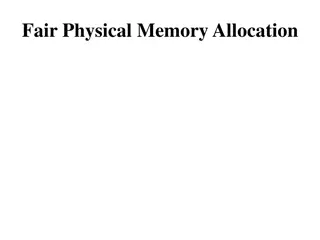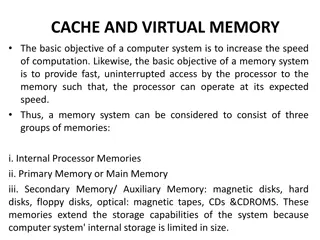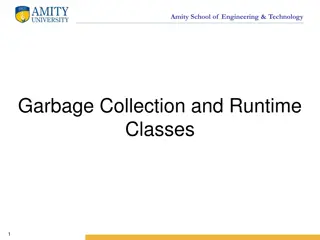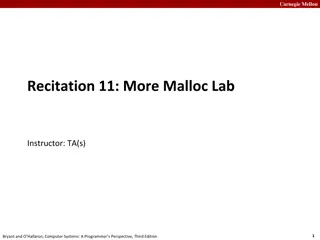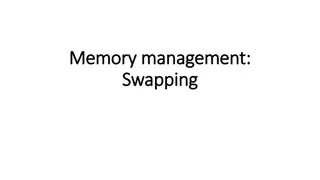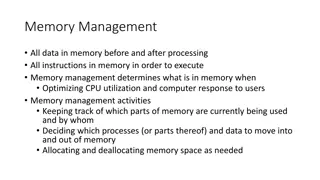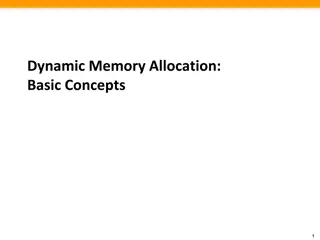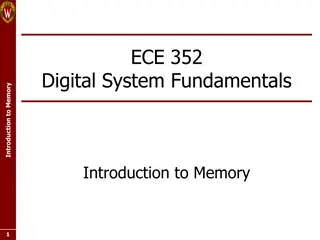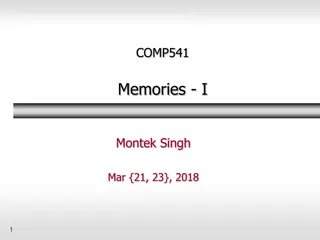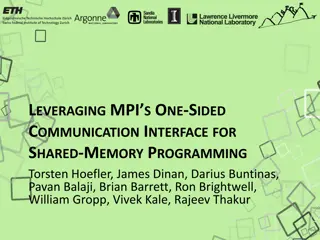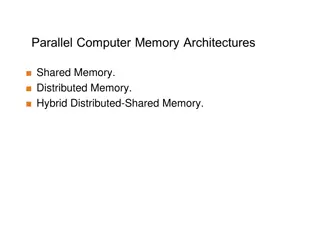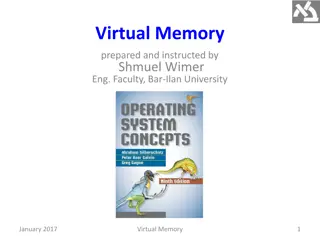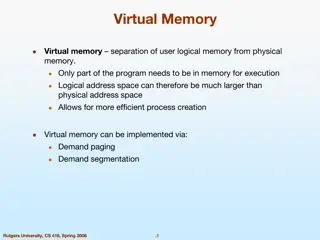Understanding Memory Management in C Programming
The discussion covers various aspects of memory management in C programming, including common memory problems and examples. It delves into memory regions, stack and heap management, and static data. The examples illustrate concepts like static storage, heap allocation, and common pitfalls to avoid. Proper memory handling is crucial to avoid issues like memory leaks, uninitialized values, out-of-bounds references, and improper use of memory functions.
Download Presentation

Please find below an Image/Link to download the presentation.
The content on the website is provided AS IS for your information and personal use only. It may not be sold, licensed, or shared on other websites without obtaining consent from the author. Download presentation by click this link. If you encounter any issues during the download, it is possible that the publisher has removed the file from their server.
E N D
Presentation Transcript
CS110 Discussion3 Weiming Hu,
Agenda C Memory Management Common Memory Problems strlen v.s. sizeof Can We Do Better? Manage Device Memory
Memory Management in C Memory Address (32 bits assumed here) Program s address space contains 4 regions Stack: local variables inside functions, grow downwards. Heap: Space for dynamic data, requested via malloc , grows upwards. Static data: Variables defined outside functions, does not grow or shrink. But can be modified. Code: Loaded when program starts. Can not be modified.
Example #include <stdio.h> #include <stdlib.h> static const int year = 2023; Expression: static &year _______ int main(void){ char name[] = "Jose"; char *game = "The Elder Scrolls"; int *ver = malloc(sizeof(int)); *ver = 5; /* Break! */ printf("Until %d, %s's favourite game is %s %d.\n", year, name, game, *ver); return 0; } stack name _______ static game _______ heap ver _______ stack &ver _______
Observations Code, Static storage are easy: they never grow or shrink Stack space is relatively easy: stack frames are created and destroyed in last-in, first-out (LIFO) order Managing the heap is tricky: memory can be allocated / deallocated at any time
Agenda C Memory Management Common Memory Problems strlen v.s. sizeof Can We Do Better? Manage Device Memory
Common Memory Problems Using uninitialized values Using memory that you don t own Deallocated stack or heap variable Out-of-bounds reference to stack or heap array Using NULL or garbage data as a pointer Improper use of free/realloc by messing with the pointer handle returned by malloc/calloc Memory leaks (you allocated something you forgot to later free) Or std::vector::push_back
Using Memory You Dont Own What is wrong with this code? int *ipr, *ipw; void ReadMem() { int i, j; ipr = (int*) malloc(4 * sizeof(int)); i = *(ipr - 1000); j = *(ipr + 1000); free(ipr); } void WriteMem() { ipw = (int*) malloc(5 * sizeof(int)); *(ipw - 1000) = 0; *(ipw + 1000) = 0; free(ipw); } Using pointers beyond the range that had been malloc d May look obvious, but what if mem refs had been result of pointer arithmetic that erroneously took them out of the allocated range?
Using Memory You Dont Own What is wrong with this code? int *ipr, *ipw; int offset; void ReadMem() { int i, j; ipr = (int*) malloc(4 * sizeof(int)); i = *(ipr - offset); j = *(ipr + offset); free(ipr); } void WriteMem() { ipw = (int*) malloc(5 * sizeof(int)); *(ipw - offset) = 0; *(ipw + offset) = 0; free(ipw); } Using pointers beyond the range that had been malloc d May look obvious, but what if mem refs had been result of pointer arithmetic that erroneously took them out of the allocated range? It may be non-obvious in the program.
Using Memory You Dont Own What is wrong with this code? void StringManipulate() { const char *name = "Safety Critical"; char *str = malloc(10); strcpy(str, name, 10); str[10] = '\0'; /* Write Beyond Array Bounds */ printf("%s\n", str); /* print Safety Cri*/ /* Read Beyond Array Bounds */ } Reference beyond array bounds
Using Memory You Dont Own What is wrong with this code? char *append(const char* s1, const char *s2) { const int MAXSIZE = 128; char result[128]; int i=0, j=0; for (j=0; i<MAXSIZE-1 && j<strlen(s1); i++,j++) { result[i] = s1[j]; } for (j=0; i<MAXSIZE-1 && j<strlen(s2); i++,j++) { result[i] = s2[j]; } result[++i] = '\0 ; return result; } result is a local array name stack memory allocated Function returns pointer to stack memory won t be valid after function returns Beyond stack read/write
Using Memory You Dont Own What is wrong with this code? typedef struct node { struct node* next; int val; } Node; int findLastNodeValue(Node* head) { while (head != NULL) { head = head->next; } return head->val; } Following a NULL pointer to mem addr 0!
Faulty Heap Management What is wrong with this code? int *pi; void foo() { pi = malloc(8*sizeof(int)); /* Allocate memory for pi */ /* Oops, leaked the old memory pointed to by pi */ free(pi); /* foo() is done with pi, so free it */ } void main() { pi = malloc(4*sizeof(int)); foo(); /* Memory leak: foo leaks it */ } Memory leak: more mallocs than frees
Faulty Heap Management What is wrong with this code? int *plk = NULL; void genPLK() { plk = malloc(2 * sizeof(int)); plk++; } Potential memory leak handle has been changed, do you still have copy of it that can correctly be used in a later free?
Misuse of free() What is wrong with this code? void FreeMemX() { int fnh = 0; free(&fnh); } void FreeMemY() { int *fum = malloc(4 * sizeof(int)); free(fum+1); free(fum); free(fum); } Can t free non-heap memory; Can t free memory that hasn t been allocated
Managing the Heap realloc(p,size) Resize a previously allocated block at p to a new size If p is NULL, then realloc behaves like malloc If size is 0, then realloc behaves like free, deallocating the block from the heap Returns new address of the memory block; NOTE: it is likely to have moved! calloc(p,size) Allocation with initialization: malloc() + memset()
Agenda C Memory Management Common Memory Problems strlen v.s. sizeof Can We Do Better? Manage Device Memory
strlen v.s. sizeof #include <stdio.h> #include <string.h> int main(){ /*I use a 64-bit system*/ char* ptrStr = "sist1"; char listStr1[] = "sist1"; char listStr2[10] = "sist1"; printf("%d\n", sizeof(ptrStr)); /* sizeof: 8, a ptr takes 8 bytes, 64 bits! */ printf("%d\n", strlen(ptrStr)); /* strlen: 5 */ printf("%d\n", sizeof(ptrStr + 2)); /* sizeof: 8, a ptr takes 8 bytes, 64 bits! */ printf("%d\n", sizeof(*(ptrStr + 2))); /* sizeof: 1 */ printf("%d\n", strlen(ptrStr + 2)); /* strlen: 3 */ printf("%d\n", sizeof(listStr1)); /* sizeof:6 */ printf("%d\n", strlen(listStr1)); /* strlen:5 */ printf("%d\n", sizeof(listStr2)); /* sizeof: 10 */ printf("%d\n", strlen(listStr2)); /* strlen: 5 */ return 0; }
Agenda C Memory Management Common Memory Problems strlen v.s. sizeof Can We Do Better? Manage Device Memory
Can We Do Better? Many language implements more advanced memory management C++: Smart pointers, RAII, https://web.stanford.edu/class/archive/cs/cs106l/cs106l.1192/lectures/lecture15/15_RAII.pdf Rust: Ownerships References and Borrowing https://doc.rust-lang.org/book/ch04-02-references-and-borrowing.html Java, Python, : Garbage Collection https://www.oracle.com/webfolder/technetwork/tutorials/obe/java/gc01/index.html
Agenda C Memory Management Common Memory Problems strlen v.s. sizeof Can We Do Better? Manage Device Memory
Manage Device Memory 1. 2. Copy data to GPU memory CPU instructs the GPU (kernel configuration and launching) Data processed by many cores in parallel Copy result back to main memory Parallel Implementation of Grayscale Conversion in Graphics Hardware, 2011 Examples: Parallel Computing, Deep Learning, Use GPU / Device memory: 3. 4. #include <stdio.h> int main(){ int size_array = 1024; int *h_a, *d_a; h_a = (int*)malloc(size_array * sizeof(int)); cudaMalloc((void**)&d_a, size_array * sizeof(int)); for(int i = 0; i < size_array; i++) h_a[i] = i; cudaMemcpy(d_a, h_a, size_array * sizeof(int), cudaMemcpyHostToDevice); /* Call CUDA Kernel Function*/ cudaMemcpy(h_a, d_a, size_array * sizeof(int), cudaMemcpyDeviceToHost); free(h_a); cudaFree(d_a); return 0; }
Conclusion All data is in memory Each memory location has an address to use to refer to it and a value stored in it Pointer is a C version (abstraction) of a data address * follows a pointer to its value & gets the address of a value Arrays and strings are implemented as variations on pointers C is an efficient language, but leaves safety to the programmer Variables not automatically initialized Use pointers with care: they are a common source of bugs in programs
Conclusion Contd C has three main memory segments in which to allocate data Static Data: Variables outside functions Stack: Variables local to function Heap: Objects explicitly malloced/freed. Heap data is biggest source of BUGs in C code


